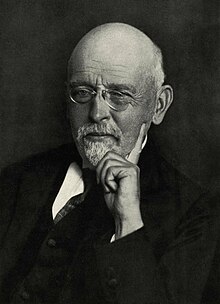Carl Hosius
Carl Hosius (born March 21, 1866 in Neuwied ; † July 17, 1937 in Würzburg ) was a German classical philologist who worked as a lecturer and professor in Münster (1891–1906), Greifswald (1906–1913) and Würzburg (1913–1933 ) taught. As a great connoisseur of Latin literature and language, he was responsible for numerous text editions and reworked the Roman literary history of Martin Schanz ( Schanz-Hosius ).
life and work
Carl Hosius was the seventh of eight children of the lawyer and politician Clemens Hosius (1822-1902). When visiting the Hammonense grammar school in Hamm, the grammar school director and teacher of ancient languages Carl Jesaias Heraeus (father of the philologist Wilhelm Heraeus ) influenced him to study classical philology. Hosius began his studies in Münster and Freiburg im Breisgau ; He received the greatest stimulus in Bonn from Hermann Usener and Franz Bücheler . This led him to occupy himself with the textual criticism of Latin authors. Hosius wrote his dissertation in 1888 on the interpolations of a handwriting by Juvenal ; In the same year his work Apparatus criticus ad Iuvenalem was published . During his studies he became a member of the KDStV Sauerlandia Münster in the CV in 1883 . In the following years he also studied the manuscripts of the authors Lucan , Gellius and Properz on research trips in various libraries . He achieved his habilitation in Münster in 1891 with a thesis on Lucan, which appeared in 1892 as a critical edition of the civil war epic. The edition Die Moselgedichte des Decimus Magnus Ausonius and Venantius Fortunatus followed in 1894 . In recognition of his achievements, Hosius was appointed associate professor in Münster in 1897.
A call from the University of Greifswald made him leave Münster in 1906. In Greifswald, Hosius taught and researched as a full professor for seven years before moving to Würzburg in 1913 . Here he taught until his retirement (1933); in the academic year 1930/1931 he was the rectorate of the university. His teaching success is evident not least in his students, whose first works Hosius published in the series Würzburg Studies on Classical Studies . A commemorative publication by his students and colleagues Hildebrecht Hommel , Karl Keyßner , Josef Martin , Friedrich Pfister and Joseph Vogt on his 70th birthday (1936) with the title Studies on Tacitus also appeared in this series .
It can be attributed to the influence of the Bonn school that Hosius spent his life studying the textual criticism and explanations of the Latin poets. In terms of methodology, he leaned heavily on Karl Lachmann and, by strictly adhering to the handwriting that he recognized as the “best”, produced quite conservative texts. Even if his decisions have been revised in detail to this day, his overall performance remains an important contribution to textual criticism.
In addition to his editions, Hosius is particularly known as the editor of the history of Roman literature ( Handbuch der Altertumswwissenschaft Volume 8.1). The author of this work, Martin Schanz , died unexpectedly in 1914. The revision for the fourth edition was therefore carried out by his Würzburg successor, Hosius. Supported by Gustav Krüger for Christian literature , he first published the later volumes (Volume IV 1920, Volume III 1922), then the rest (Volume I 1927, Volume II 1935). This new edition, with which Hosius was busy until his death, remained the history of Roman literature a standard work, of which 1959, 1966–1967 and 1979–1980 unchanged reprints appeared. It was only partially replaced by the revision by Reinhart Herzog and Peter Lebrecht Schmidt (1997–2002).
literature
- Josef Martin: Carl Hosius , in: Annual report on the progress of classical antiquity , Volume 262 (1938), pp. 65–72.
- Carl Becker : Hosius, Karl. In: New German Biography (NDB). Volume 9, Duncker & Humblot, Berlin 1972, ISBN 3-428-00190-7 , p. 649 f. ( Digitized version ).
Individual evidence
- ↑ Complete directory of the CV The honorary members, old men and students of the Cartell Association (CV) of the cath. German student associations. 1912, Strasbourg i. Els. 1912, p. 291.
Web links
- Literature by Carl Hosius in the catalog of the German National Library
| personal data | |
|---|---|
| SURNAME | Hosius, Carl |
| ALTERNATIVE NAMES | Hosius, Karl |
| BRIEF DESCRIPTION | German classical philologist |
| DATE OF BIRTH | March 21, 1866 |
| PLACE OF BIRTH | Neuwied |
| DATE OF DEATH | July 17, 1937 |
| Place of death | Wurzburg |



